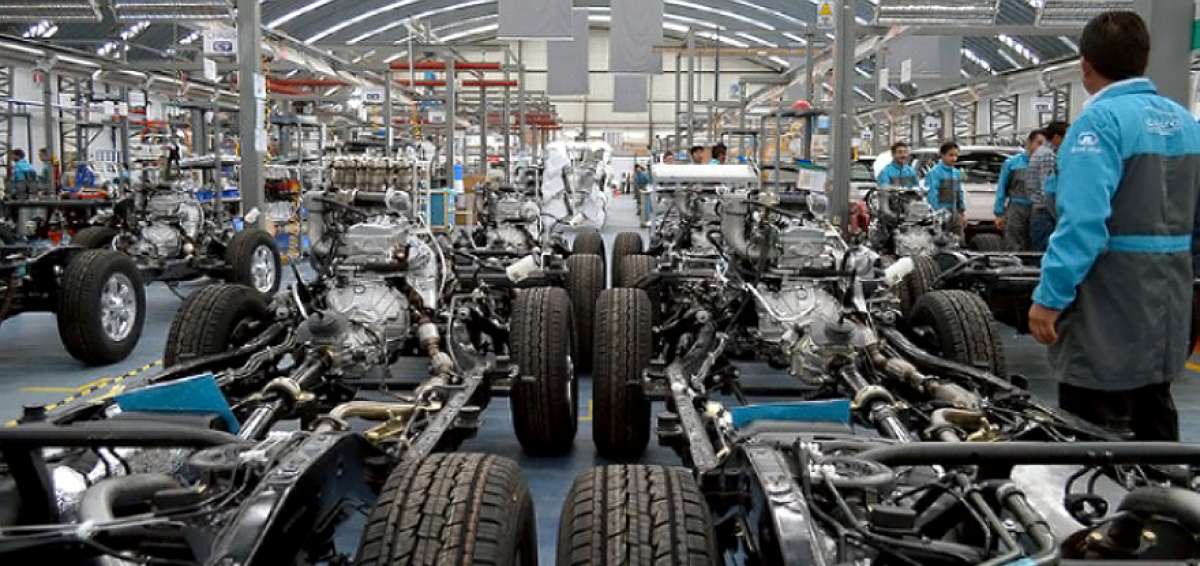The General Motors assembly plant in Ecuador produces 51% of the cars assembled in the country, primarily the Chevrolet D-Max.
The closure of the General Motors car assembly plant in Ecuador, GM OBB, scheduled for August 2024, is a hard blow for the national industry, which in the last decade has experienced a drastic reduction in its participation in total car sales.
Of the 21,789 vehicles assembled by the national industry in 2023, 51% corresponds to GM OBB, with its D-Max truck from the Chevrolet brand being the best-selling model in the country.
General Motors announced on April 26, 2024, that its operations in Ecuador and Colombia will transition to a national “vehicle marketing and after-sales service” company model to support the launch of new generation vehicles.
The company explained in a statement that this transformation of the business model aims to address the “challenges of the growing fragmentation of markets,” as well as the underutilization of plants. In the case of GM OBB, it is operating at only 13% of its installed capacity.
For the president of the Chamber of the Ecuadorian Automotive Industry (Cinae), David Molina, General Motors’ decision, affecting an industry that employs about 300 people in Ecuador, is a consequence of the reality of the national market.
“Ecuador became a very expensive country to produce, and in the last governments, there has been no industrial public policy, only an agenda of trade opening has been pushed without incentives for the productive sector,” Molina considers.
According to the union representative, the signing of the trade agreement with China, which will come into effect in May, closed any possibility of General Motors producing other models in the country and accelerated other decisions, such as the closure of its assembly plant. Chinese cars, with a share of 36%, are the best sellers in the country.
Continuous fall in production
GM OBB has almost 50 years of operations in the country. In its first years, it was only Omnibus BB, but soon General Motors joined as a shareholder.
Like the national market, this industry has seen its production reduced over time. In 2010, the plant assembled 54,174 units of Aveo, D-Max, Vitara, Grand Vitara, and Sail models.
But by 2023, its production was reduced to the D-Max model and had fallen by almost 80% compared to 2010, according to Cinae data.
However, the D-Max truck has remained the best-selling model in the country, between imported and locally produced. Among those assembled locally, Kia’s Sonet SUV follows.
With GM’s departure from the assembly market, the participation of this industry in vehicle sales will also be reduced by half, from the 14.2% it closed in 2023 to possibly 8%, Molina estimates.
“But we have to look at how the market reacts; perhaps another actor in the chain is considering assembling, but that requires an incentive policy from the Government; otherwise, auto parts manufacturers will begin to close,” adds the director of Cinae.
Entire parts chain affected
In the country, there are around 50 auto parts manufacturing companies that supply the assembly industry, of which at least 25 are direct suppliers of GM OBB, Molina estimates. But he clarifies that there are also other indirect suppliers that will be affected.
Indima supplies General Motors with exhaust systems and body parts, such as the load protection bar, for the D-Max.
The sale of these parts for all D-Max represents between 40% and 50% of Indima’s annual sales, explains Juan Bermeo, manager of the company, which has its plant in the Carcelén Industrial sector, north of Quito, very close to GM OBB.
Seventy people work at Indima, a payroll that has been reduced by more than half in the last five years due to the same market situation.
Bermeo considers that the departure of GM OBB puts the entire assembly and auto parts industry at risk, with the foreseeable loss of talent and technology.
“The industrial base of auto parts is very modern, high technology; now it is at risk of disappearing. Some auto parts have already closed their plants due to a reduction in the market. It is a dark day for the Ecuadorian industry,” says Bermeo.
The sector has 4,500 employees
The manager of Indima, a company that also supplies other assemblers and the spare parts market, clarifies that there is no other company in the country that can absorb what the auto parts sector provided to GM OBB.
“The replacement market is not enough to utilize all the installed capacity of our plant,” he adds. However, the Indima plant is already underutilized due to the reduction in the assembly industry. Of an installed capacity to produce 90,000 exhaust systems per year, they only reach between 12,000 and 15,000 pieces.
The auto parts industry employs about 4,500 people. A part of this sector focuses on the original vehicle assembly market, and others also produce for the replacement market, such as tires and batteries.
The director of Cinae considers that one of the policies that the Government should promote to counteract the impact that this sector will suffer is a tariff incentive plan for dealers to promote the incorporation of local parts in the replacement of parts and after-sales.


0 Comments